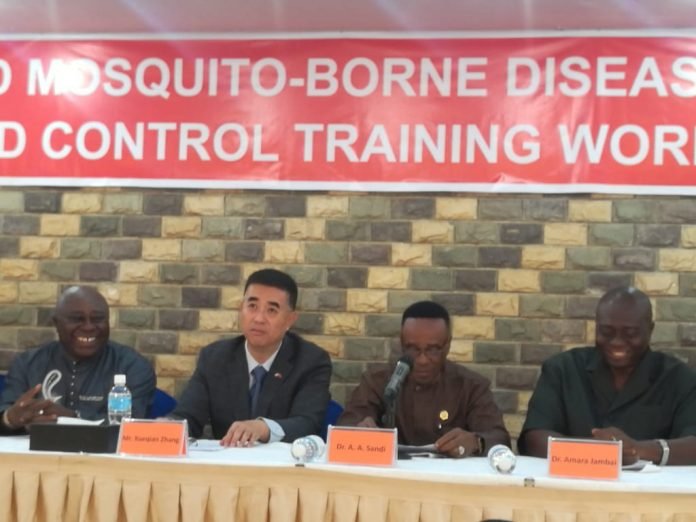By Sam Pratt
A four day training organized by Ministry of Health in collaboration with China CDC commenced at the Bintumani Hotel on the 28th November 2019.
In his address to the participants, Deputy Minister of Health, Dr. Jonathan Sandi said due to various interventions over the years fewer people are infected and die of malaria. He said however Sierra Leone still needs more to do to lessen the infection and deaths.
“I want to thank the China CDC and other partners that have been working together to eradicate malaria in the country. You have done very well and for you to organize such training for our health workers bringing experts from China to help us is a great stride that we must appreciate and work with you so that we can achieve the required result.”
Dr Sandi said he was told that this is the first such training China CDC is doing in Africa and the trainees must be proud and make good use of it so that they will be able to implement what they have learnt.
The Chinese Economic Counselor of the Chinese Embassy Mr Zhang Xueqian said Mosquito-borne disease is a major threat to global health. In terms of malaria, there were 216 million malaria cases and 445,000 malaria deaths all over the world in 2017.
He noted that recognizing the large global disease burden; the United Nations Sustainable Development Goals for 2030 include combating malaria, which is very serious in Africa. “According to the estimates in the World Malaria Report 2018, there were 194 million malaria cases (89.8% of the world) and 407,000 malaria deaths (91.5% of the world) in Africa. In the African continent, Sierra Leone is one of the countries severely affected by malaria with a high prevalence and deaths. Although it has made an ambitious goal, malaria control and elimination is still a big challenge.”
Counselor Zhang said in order to share the latest knowledge and experience on control and prevention of mosquito-borne disease as well as the progress on operational researches, and to explore the potential approaches towards forming an international collaborative network of Mosquito-borne disease control and elimination in Africa, China CDC and The Ministry of Health and Sanitation of Sierra Leone are jointly organized this Training. He said they are delighted to have some Chinese experts with extensive experience in mosquito-borne disease prevention and control to share their ideas and knowledge with local experts in the next few days, and explore potential barriers and approaches towards control and eliminating mosquito-borne disease in Sierra Leone and other African countries.
The chairman of the programme, Dr Amara Jambai said Sierra Leoneans want to know and use the model that China used to eradicate malaria in their country.
He said China has mosquitoes but they do not have malaria. This he said Sierra Leone is working towards to give longer lives to Sierra Leoneans in the future.
“I am very proud of China because of their commitment to make Sierra Leone free of sickness as they are always working with us to change the scenario. They have given us a P3 bio-safety lab, hospital and many medical staff working in the country.”
Dr Jambai said those that are attending the training must understand that when they finish they should be able to take the lead in the drive to eradicate this dangerous sickness.
He thanked the team coming from China to conduct the training and all other partners that are working with them to make sure that Malaria is cornered and be a thing of the past in the coming year.
Other speakers included Dr Smith, Dr Donald Bask Taqi, Dr Xiaopeng Qi who came from China and will be in charge of the training and Dr Thomas Samba.
Dr Qi said she believes that this training will have positive and far-reaching impact on China-Sierra Leone public health cooperation, especially for mosquito-borne disease prevention and control cooperation.
“I hope that all experts will work together to make this training a great success.”




